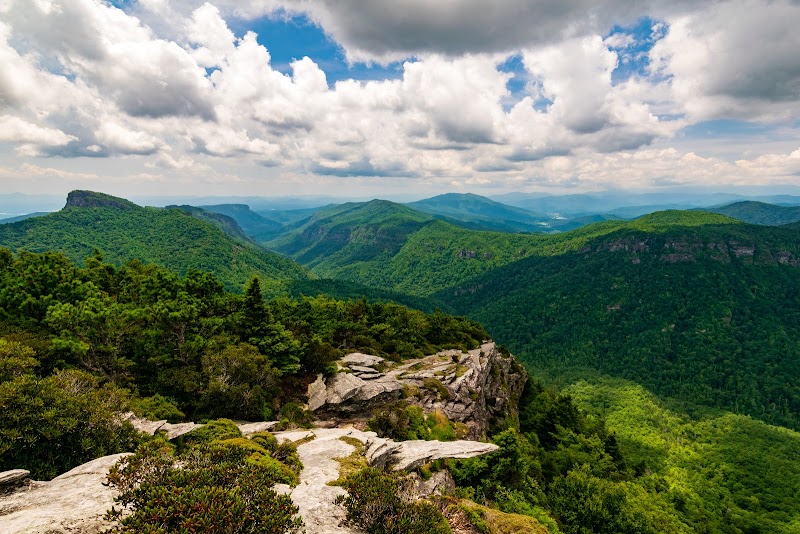
Shanty Spring and Early Trails at Grandfather Mountain: A Journey into Wilderness History
Shanty Spring at Grandfather Mountain offers a rare glimpse into the early history of North Carolina’s High Country, combining rugged hiking with a tangible link to pioneer survival. Discover the trails that test your skills and connect you with the mountain’s enduring wild spirit.
Bring Sturdy Footwear
Expect uneven terrain with roots and slippery rocks along the trail—hiking boots with good traction are essential to stay steady on your feet.
Hydrate and Filter
Carry enough water for the hike; while Shanty Spring offers fresh water, it should be treated with a filter or purifier before drinking.
Start Early to Avoid Afternoon Storms
Mountain weather shifts rapidly; beginning your hike in the morning reduces the chance of encountering sudden rain or storms.
Layer Up for Changing Conditions
Temperatures can vary quickly between shaded forest and exposed ridges; dressing in layers helps manage comfort throughout the hike.
Shanty Spring and Early Trails at Grandfather Mountain: A Journey into Wilderness History
The Shanty Spring at Grandfather Mountain stands as a gateway to both history and nature, whispering tales of early settlers and the mountain’s rugged charm. Located along the rugged ridges in North Carolina’s High Country, Shanty Spring was once a vital water source for settlers who braved this fiercely untamed landscape. The cool, clear water that slips from the rocks still reflects the mountain’s wild spirit, daring hikers to explore the paths those first adventurers trod.
Grandfather Mountain’s early history is tightly woven with the lives of these pioneers, who carved shanties and campsites near natural springs to survive the relentless mountain weather. This area’s trails trace some of the oldest routes through the Appalachians, paths originally formed for hunting, logging, and connection between remote homesteads. The terrain here tests endurance—a mixture of steep ascents, rocky outcrops, and dense woodlands that challenge both body and mind.
A hike to Shanty Spring trails spans roughly 3.5 miles round trip, with an elevation gain of about 800 feet. The ground beneath your boots ranges from soft pine needle carpets to uneven, root-laced soil that demands steady footing. The forest here feels alive, as if watching every step with the patient eyes of ancient oaks and spruce, the wind carrying the calls of songbirds and the rustle of unseen critters.
Preparation is key. Good hiking shoes with solid tread keep you nimble on slippery rocks, while ample water is crucial—though tempting, the spring water should be filtered before drinking. Timing your journey in the morning hours helps you avoid afternoon storms and enhances your chances of catching crisp, clear views atop ridges that stretch endlessly into the horizon.
As you move upward, the mountain seems almost to breathe with you—the rocks holding their own stories, the trees leaning in, and cool breezes pushing gently against your chest. Shanty Spring offers more than a source of hydration; it connects you to a past where survival hinged on respect for the land’s relentless character.
Exploring Grandfather Mountain’s early history through the Shanty Spring trail not only invites adventure but asks for reverence. This is a wild place, fiercely itself, where every step honors the endurance of those who came before and the raw beauty that continues to define it today.
Nearby Trips
All Adventures
Boat Charters
Water Activities
Adventures near Linville, North Carolina
Discover the unique and memorable adventures that make Linville, North Carolina special.
Frequently Asked Questions
Can I drink directly from Shanty Spring?
While Shanty Spring offers clear mountain water, it’s recommended to use a filtration system or purifier before drinking to avoid potential contaminants.
Is the Shanty Spring trail suitable for beginners?
The trail is moderately challenging due to elevation and uneven terrain. Beginner hikers should be prepared with proper footwear and moderate fitness levels.
Are pets allowed on the trail near Shanty Spring?
Pets are allowed but should be kept on a leash. Be mindful of wildlife and trail conditions to keep your pet safe.
What wildlife might I encounter near Shanty Spring?
Expect to see black bears, white-tailed deer, varied songbirds, and occasionally wild turkeys. Hiking quietly increases chances to observe without disturbing animals.
Is the trail accessible year-round?
Yes, but conditions vary greatly with the seasons. Winter can produce icy, hazardous conditions, and spring may bring muddy terrain.
Are there historical markers or interpretive signs at Shanty Spring?
The area contains few physical markers, but local guides or park staff sometimes provide historical context at visitor centers or along more popular routes.
Recommended Gear
Hiking Boots
Provides ankle support and good traction on the rocky, root-strewn trails.
Water Filter or Purifier
Ensures safe drinking water from the spring and natural sources along the hike.
Layered Clothing
Adapts to temperature changes from shaded forest to exposed ridges.
Trekking Poles
Helps maintain balance on steep or uneven ground, especially near rocky sections.
Local Insights
Hidden Gems
- "A small, lesser-known viewpoint near the spring offers quiet panorama views without crowds."
- "The nearby valley features early settler ruins, faint but visible from certain angles."
Wildlife
- "Black bears frequently traverse ridges after dusk, making early hiking advisable."
- "The area is a prime habitat for the northern flying squirrel, rarely seen but present in dense forests."
History
"Shanty Spring was a critical water stop for pioneers navigating the rugged Grandfather Mountain ridge, serving as a survival point for early homesteads and hunters."
